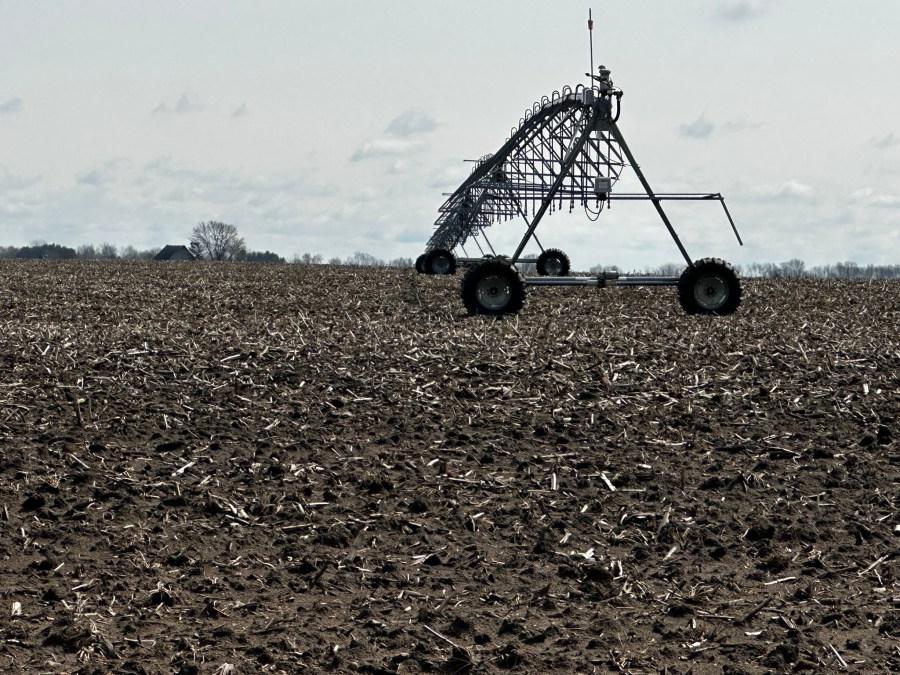Water dissolving Indiana farmers’ political loyalties
INDIANAPOLIS — Tucked into the bends along the Wabash River in western Tippecanoe County is farm country, where you will find signs of growing distrust.
In front of seemingly every home is a placard reading, “Stop The Water Steal.”
One of these signs is in the front yard of Carly and Gentry Sheets.
“It should be state government working for us not working against us,” said Carly.
This is how the Sheets family views the proposal to pump tens of millions of gallons of water each day from the aquifers beneath the Wabash. It’s part of the Indiana Economic Development Corporation’s ambitious plan to potentially supply water to a huge 9,000-acre industrial park 40 miles away in Boone County.
Gentry said, “I’m not against development, but it just gives me an uneasy feeling.”
Here’s why:
The soil Gentry works on each year is sandy and doesn’t hold moisture very well.
“If we do get an inch of rain, within three or four days, it’s getting dry again,” Gentry said.
To supplement when the weather is dry, he runs radial irrigation systems. They operate like large, wheeled, windshield wipers slowly rolling across fields, watering the planted corn and soybeans. With so many factors beyond his control, having the option to keep water on his crops provides Gentry some peace of mind.

Many farms here operate the same way, and the concern is that a pipeline could limit or interrupt access to water.
That sentiment is widespread in Tippecanoe County. In response, County Commissioners voted unanimously in November to place a temporary moratorium on large water extractions.
The reaction from IEDC head David Rosenberg was to dismiss the move. In an interview with State Affairs, he called pipeline opposition “just based on misinformation.”
Rosenburg also noted, “We’ve been having meetings with Lafayette region stakeholders since September of 2022.”
When FOX59 and CBS4 asked who was in those meetings, we were provided a list. It included Greater Lafayette Commerce; the mayors of Lafayette, West Lafayette, and Lebanon; commissioners from Boone and Tippecanoe Counties; companies and educational institutions.
Farmers and agri-businesses were not on that list.
“I think we were taken for granted,” says Randy Kron, president of Indiana Farm Bureau (IFB).
“We’ve pushed ourselves into several of those conversations, but it’s only because we’ve done it, not because we were invited.”
According to Kron, IFB members are extremely focused on the pipeline issue and are looking ahead to this year’s elections.
“One of our priorities this year will be talking to those running for the Statehouse and for Governor about water,” said Kron.
The IFB’s political action committee AgELECT will consider candidates positions on water and pipelines when making endorsements.
Before voters head to the polls in November, it’s expected the Indiana Finance Authority will release results on a 13-county study that’s widely expected to shed light on whether there is sufficient water underground to sustain a possible pipeline.
The Sheets are not going to rely on that report.
“I already have zero trust,” said Carly.
Because they and their farming neighbors feel shut out of conversations about water studies and pipelines, the Sheets are skeptical about the resulting data.
Instead, the lifelong Republican voters have reconsidered their party loyalty.
“I am guilty in the past going and just doing a blanket Republican ticket, and that will no longer be the case,” said Carly.
“This will 100% influence how I vote,” Genry added. “I mean, there are certainly candidates that I will not vote for based on their stance.”
To earn their votes, the Sheets are looking for candidates who will protect their way of life, and that includes the water beneath their farm fields.

Comments are closed.